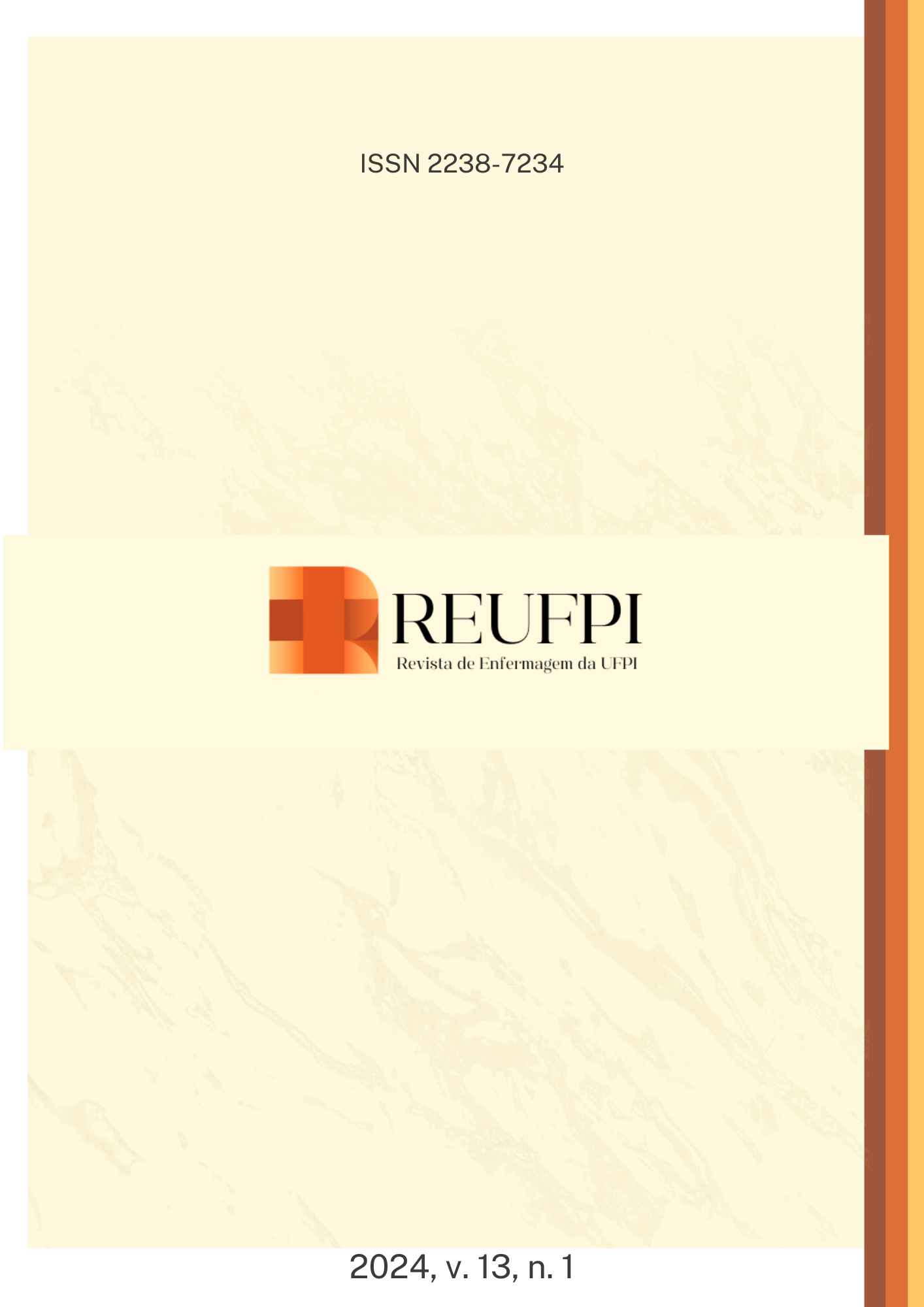Health education for people living with HIV in partial virologic suppression: convergent care research
DOI:
https://doi.org/10.26694/reufpi.v13i1.4249Palavras-chave:
Nursing, HIV, Acquired Immunodeficiency Syndrome, Cooperation and Adherence to Treatment, Health educationResumo
Objective: To analyze the process of implementing health education for people living with HIV in partial viral suppression with a view to rescuing adherence to antiretroviral therapy. Methods: Convergent Care Research carried out with 13 HIV-infected people, with partial viral suppression. Through the stages of conception, instrumentation, scrutiny and analysis, the reasons for treatment failures were identified, health education was implemented and the process was analyzed with interviews and content analysis. The educational process took place with the support of educational technology: Educational Material on HIV (INPI: BR 10 2020 003765 0). Results: Treatment failures were due to the following reasons: side effects, prejudice, family problems, difficulty in accessing the health service and forgetfulness. Three categories emerged from the speeches after the intervention: 1- Awakening to the importance of the correct use of antiretroviral therapy; 2- Feelings arising from the educational process; 3- Knowledge and overcoming social stigmas. Conclusion: Educational technology, added to the choice of participatory research as a method, provided learning for all involved, making it possible to perceive the importance of strengthening the teaching-service bond, the use of dialogue in the context of collectivity and investigative convergence for care practice.
Referências
Joint United Nations Programme on HIV/AIDS. In Danger: UNAIDS Global AIDS Update2022 [Internet]. Geneva; 2022 [citado 2022 set 25]. Available from: https://www.unaids.org/sites/default/files/media_asset/2022-global-aids-update_en.pdf.
Ministério da Saúde (BR). Secretaria de Vigilância em Saúde. Departamento de Vigilância, Prevenção e Controle das Infecções Sexualmente Transmissíveis, do HIV/Aids e das Hepatites Virais. Protocolo clínico e diretrizes terapêuticas para manejo da infecção pelo HIV em adultos. Brasília: Ministério da Saúde; 2018.
Haguihara H, Silva MO, Rebouças MC, Netto EM, Brites C. Factors associated with mortality in HIV patients failing antiretroviral therapy, in Salvador, Brazil. Brazilian J Infect Dis [Internet]. 2019; 23 (3):160-3. doi: https://doi.org/10.1016/j.bjid.2019.06.001
World Health Organization (WHO). Global update on HIV treatment 2013: results, impact and opportunities: WHO report in partnership with UNICEF and UNAIDS. Geneva; 2013. 105 p.
Ministério da Educação (BR). Conselho Nacional de Educação. Câmara de Educação Superior. Resolução nº 3, CNE/ CES, de 7 de novembro de 2001. Institui diretrizes curriculares nacionais do curso de graduação em enfermagem. Diário Oficial da União [Internet], Brasília (DF). 9 nov 2001; Sec. 1, p. 37. [citado 2021 nov 24]. Available from: http://portal.mec.gov.br/cne/arquivos/pdf/CES03.pdf
Lei n. 7.498 de 25 de junho de 1986 (BR). Dispõe sobre a regulamentação do exercício da enfermagem e dá outras providências. Diário Oficial da União [periódico na internet], Brasília (DF). 26 jun 1986 [citado 24 nov 2021]. Available from: http://www.planalto.gov.br/ccivil_03/leis/l7498.htm
Teixeira E, Palmeira IP, Rodrigues ILA, Brasil GB, Carvalho DS, Machado TDP. Participative development of educational technology in the HIV/AIDS context. Reme: Rev. Min. Enferm. [Internet]. 2019; 23: e-1236. doi: http://dx.doi.org/10.5935/1415-2762.20190084
Lima ACS, Cabral BG, Capobiango JD, Soares MH, Pieri FM, Kerbauy G. “Educational Material on HIV”: validity of health educational technology for people living with HIV. Rev Bras Enferm.[Internet]. 2023;76(3):e20220549. doi: http://dx.doi.org/10.1590/0034-7167-2022-0549pt
Trentini M, Paim L, Silva DMGV. Pesquisa Convergente Assistencial: delineamento provocador de mudanças. Porto Alegre (RS): Moirá; 2014
Bardin, L. Análise de conteúdo. Edição revista e actualizada. Lisboa: Edições 70, 2020.
Tong A, Sainsbury P, Craig J. Consolidated criteria for reporting qualitative research (COREQ): a 32-item checklist for interviews and focus groups. Int J Qual Health Care. [Internet]. 2007;19(6):349–57. doi: https://doi.org/10.1093/intqhc/mzm042
Umeokonkwo CD, Onoka CA, Agu PA, Ossai EN, Balogun MS, Ogbonnaya LU. Retention in care and adherence to HIV and AIDS treatment in Anambra State Nigeria. BMC Infect Dis [Internet]. 2019 [citado 2021 mai 22]; 19:654. doi: https://doi.org/10.1186/s12879-019-4293-8
Goulart S, Meirelles BHS, Costa VT, Pfleger G, Silva LM. Adherence to antiretroviral therapy in adults with HIV/AIDS treated at a reference service. Rev. Min. Enferm. [Internet]. 2018; 22: e-1127. Doi: http://dx.doi.org/10.5935/1415-2762.20180050
Monteiro RSM, Feijão AR, Barreto VP, Silva BCO, Neco KKS, Aquino ARG. Ações educativas sobre prevenção de HIV/AIDS entre adolescentes em escolas. Enfermería Actual de Costa Rica. [Internet]. 2019;(37):206-22. doi: http://dx.doi.org/10.15517/revenf.v0ino.37.36749
Danielski K, Prado ML, Lima MM, Kempfer SS, Heinzle MRS, Canever BP. Tecnologías de la información y la comunicación para la educación de la ciudadanía global de enfermeros. MLS Educational Researc. [Internet]. 2020;4(2):7-21. doi: https://doi.org/10.29314/mlser.v4i2.183
Santos DJL, Paiva SS, Filho OCB, Moura NAV. Visita pré-operatória de Enfermagem: avaliação da aprendizagem após utilização de um software autoinstrucional. Rev Enferm UFPI [Internet]. 2017 [citado 2021 Mai 20];6(4):15-21. Available from: https://ojs.ufpi.br/index.php/reufpi/article/view/6315/pdf
Gomes AR, Colombo Junior, PD. Diálogos Necessários: Neurociência, Emoções e a Formação Inicial de Professores. Revista Ibero-americana de Educación. [Internet]. 2018 [citado 2021 Mai 21]; 78 (1):183-204. Available from: https://rieoei.org/RIE/article/view/3231/3998
Mesquita AM. A formação de valores no processo educativo do sujeito concreto. Interação Em Psicologia. [Internet]. 2020. 24(3): 375-84. doi: http://dx.doi.org/10.5380/riep.v24i3.72853
Moreira SR, Souza VMF, Silva RP, Menezes HF, Camacho ACLF, Silva S. Importância de Tecnologia Educacional para Usuários Submetidos a Cineangiocoronariografia. Research, Society and Development. [Internet]. 2021;10(14). doi: http://dx.doi.org/10.33448/rsd-v10i14.22008
Angelim RCM, Brandão BMGM, Freire DA, Abrão FMS. Processo de morte/morrer de pessoas com HIV/AIDS: perspectivas de enfermeiros. Rev Cuid. [Internet]. 2017; 8(3):1758-66. doi: https://doi.org/10.15649/cuidarte.v8i3.414
Melo DS de, Mello R. Representações sociais de pessoas vivendo com HIV: autopercepção da identidade egoecológica. Saúde debate [Internet]. 2022 out-dez;45(131):1101-10. doi: https://doi.org/10.1590/0103-1104202113112
Fonseca LKS, Santos JVO, Araújo LF, Sampaio AVFC. Análise da estigmatização no contexto do HIV/AIDS: Concepções de Pessoas que Vivem com HIV/AIDS. Gerais, Rev. Interinst. Psicol. [Internet]. 2020 Ago; 13(2):1-15. doi: http://dx.doi.org/10.36298/gerais202013e14757
Downloads
Publicado
Como Citar
Edição
Seção
Licença
Copyright (c) 2024 Rev Enferm UFPI

Este trabalho está licenciado sob uma licença Creative Commons Attribution 4.0 International License.
Autores mantém os direitos autorais e concedem à REUFPI o direito de primeira publicação, com o trabalho licenciado sob a Licença Creative Commons Attibution BY 4.0 que permite o compartilhamento do trabalho com reconhecimento da autoria e publicação inicial nesta revista.

























